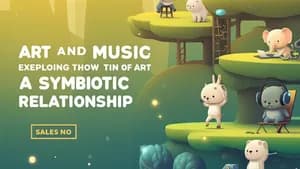Topic / Art and Music
Art and Music: A Symbiotic Relationship
Exploring the Intersection of Art and Music, examining how these disciplines complement and influence one another, from visual representations of musical concepts to the impact of musical forms on artistic styles.

The Power of Improvisation: Spontaneity in Art and Music
This piece explores the power of improvisation and spontaneity in both art and music, showing how artists and musicians use unplanned creation to produce dynamic and expressive works.
Published on Apr 5, 2025
A Historical Tapestry: Art and Music Through Time
This article explores the historical relationship between art and music, demonstrating how artistic movements have been influenced by contemporary musical styles and vice-versa.
Published on Apr 2, 2025
Light and Shadow: Exploring Spatial Dimensions in Art and Music
This article examines how light, shadow, and spatial relationships are used to create depth and dimension in both visual art and musical compositions, exploring the parallels in their creative applications.
Published on Mar 30, 2025
Geometry's Harmony: Unifying Art and Music
This article explores how geometry and mathematical principles underlie both artistic and musical composition, showcasing how harmony and balance are achieved through shared structural elements.
Published on Mar 28, 2025
Textures of Expression: Art and Music's Tactile Language
This article investigates the role of texture in both art and music, highlighting how artists and composers use tactile and visual elements to create similar feelings of depth and complexity.
Published on Mar 26, 2025
Emotional Resonance: Art and Music's Shared Impact
This article delves into the powerful emotional connections between art and music, exploring how both disciplines evoke similar feelings and create shared experiences for the audience.
Published on Mar 23, 2025
Art's Visual Language: Abstracting Music
From Kandinsky's synesthesia-inspired paintings to the minimalist compositions of Philip Glass, this article examines how artists have visually represented abstract musical concepts, pushing creative boundaries.
Published on Mar 22, 2025
Musical Structures: Shaping Artistic Composition
This article explores the influence of musical structure on artistic composition, demonstrating how musical forms like sonata form or fugue have mirrored and inspired structural elements in painting, sculpture, and architecture.
Published on Mar 19, 2025
Nature's Symphony: Art & Music's Shared Inspiration
This article analyzes the impact of natural forms and landscapes on artistic and musical expression. We'll see how the natural world has served as both inspiration and subject matter, reflecting in the forms, colors and patterns used in art and the melodies and rhythms of music.
Published on Mar 16, 2025
Art & Music: The Power of Improvisation
We explore how the concept of improvisation, a key element in jazz and other musical genres, has a parallel in spontaneous and intuitive artistic creation. This article examines the creative freedom and expressive power shared by both art forms.
Published on Mar 13, 2025
Art & Music: Mastering Space & Perspective
This article focuses on how artists and musicians employ space and perspective to create depth, dimension, and emotional impact in their work. We explore how spatial relationships in paintings reflect the structure and arrangement of musical compositions.
Published on Mar 10, 2025
Art & Music: Exploring Textural Expression
This piece delves into the expressive power of texture in both visual art and music. From the rough texture of an oil painting to the rich texture of an orchestral score, we examine how texture contributes to emotional impact.
Published on Mar 8, 2025
“A true friend is the most precious of all possessions and the one we take the least thought about acquiring.”
— Francois de La Rochefoucauld
